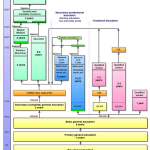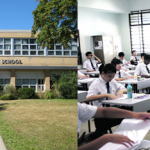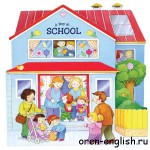Grammar schools provide academic course for selected pupils from 11 to 18—19. They give pupils a much higher level of academic instruction, which helps them to enter a university.
Technical schools offer a general education, and so, those pupils, who are more technically inclined, study at them.
Secondary modern schools were founded in England in 1944 to provide a non-academic education up to school leaving at the age of 16. A great majority of secondary modern school pupils leave school half-educated. Nowadays the general tendency in Great Britain is to reorganize all secondary education introducing comprehensive schools.
Comprehensive schools are mainly mixed, and one school of this type can provide education for over 1 thousand pupils. The main educational advantages are: schools are open to all children of all types of ability; they are mixed; a much wider range of subjects is possible; if necessary, a pupil can change from one course to another, without moving to another school; though streaming is preserved in some comprehensive schools, it is modified and made more flexible, but some schools do not stream their pupils. The comprehensive schools bring about a general improvement in the system of secondary education. In England all exams are written.
Besides the state secondary schools mentioned above, there are a number of public schools with very high fees. Few people can afford to study at these privileged educational establishments.
Higher Education. There are about 40 universities in Great Britain now. They aim to give their students the highest type of education and training and to enable them to carry out research work. After completing a course of five or four years a university graduate gets the Bachelor’s Degree of Science, Medicine, Arts, etc. Later he can continue his studies and research and defend a thesis to get the Master’s or Doctor’s Degree. A university consists of some colleges which are parts of the university. All educational institutions differ from each other in tradition, size and teaching methods. Oxford and Cambridge are the oldest ones. They have a very high reputation all over the world. Each student of Oxford or Cambridge has a tutor who helps the student to plan and organize his work, and to prepare his degree in the best possible way.
Besides universities there are about 3 hundred technical colleges and polytechnic schools in Great Britain. Their course is shorter and their graduates get diplomas instead of degrees.
The academic year consists of three terms of eight to ten weeks each, and between the terms the students have their vacations.
Vocabulary
those pupils, who are more technically inclined study at them — в них учатся те учащиеся, которые имеют большую наклонность к технике
to found — создавать, основывать
Comprehensive schools are mainly mixed — Общеобразовательные школы в основном смешанные.
public school — закрытое частное привилегированное среднее учебное заведение для мальчиков (в Англии)
to сапу out research work — проводить научно-исследовательскую работу
graduate — окончивший учебное заведение
Cambridge — Кембриджский университет
Советы учащимся:
- Не знаешь, как правильно произнести или перевести слово? http://www.lingvo-online.ru/ru- здесь ты сможешь послушать британское и американское произношение слов, а также найти их перевод.
- Не заучивай текст наизусть, попробуй пересказать его!
- Обязательно выучи все незнакомые слова с правильным произношением прежде, чем будешь пересказывать текст!
- Тяжело запомнить весь текст? Составь план текста.





